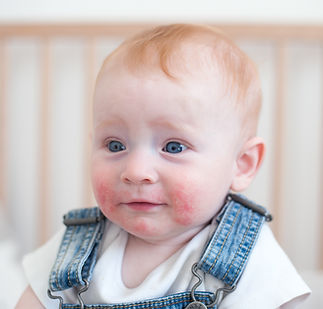Dermatitis
Dermatitis is a common skin condition caused by inflammation of the skin. There are several different forms of dermatitis but all are caused by the skin reacting to allergens or irritants. Dermatitis is usually characterized by red, itchy skin that can become blistered and weepy.
There are various causes of dermatitis and the cause determines which type of dermatitis a person is diagnosed with. The different types of dermatitis are as follows:
-
Contact dermatitis - a skin reaction to an allergen or irritant.
-
Atopic dermatitis - otherwise known as eczema due to hypersensitivity to certain foods, allergens or environmental factors. Could be genetic.
-
Neurodermatitits - caused by nerve endings underneath the skin becoming irritated.
-
Statis dermatitis - caused by varicose veins interrupting the blood flow.
-
Seborrheic dermatitis - called cradle cap in children. Possibly caused by yeast.
-
Perioral dermatitis: raised tiny red bumps aroud the mouth generally associated with use of topical steroids, cosmetics & sunscreen.
-
Dermatitis herpetiformis: This form of dermatitis is a symptom of the gut condition celiac disease, caused by an allergy to gluten.
For almost 200 years, it has been observed in the Polish salt mines that the salt miners had great skin and did not suffer from dermatitis. This was also found to be true when persons used the salt caves to hide out during World War II. The skin conditions generally cleared up.
It is thought that salt which is both anti-inflammatory and anti-bacterial, deposits on open skin areas which:
-
Increases skin ion channels, stimulating cell grown and regeneration.
-
Balances skin pH and autoflora
-
Reduced harmful bacteria and inflammation.
After a series of treatments, the common result as expressed anecdotally is:
-
Decreased itching
-
Decreased or resolved scaling of the skin
-
Drying and healing of small fissures, scratches and exudative symptoms.
Multiple studies in Russia have shown salt therapy to be an effective alternative, non-drug option for the relief of dermatitis symptoms, and of potential long term benefit as part of a total body approach to healing.

